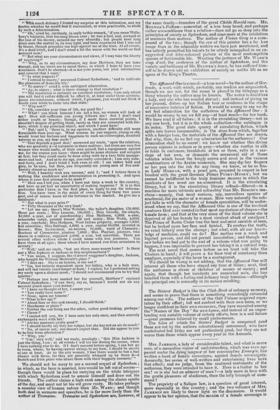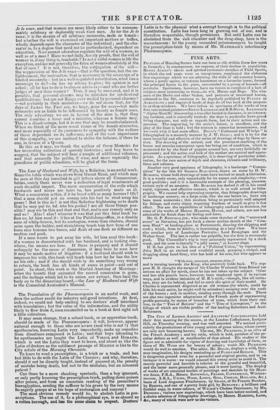Mrs. JAMESON, a lady of considerable talent, and what is
more rare, of a masculine vigour of understanding, which was even ap- parent under the dying languor of her consumptive EnnuyCe, has written a book of female sovereigns, against female sovereignty. Assuredly, her series of well-written and entertaining lives have that effect; and we judge, from the scattered sentiments of the authoress, they were intended to have it. Here is a traitor to her sex! or is she but an admirer of ours ?—a lady more in love with the gentle pleasures of obedience, than the lolly triumph of com- mand ?
The propriety of a Salique law, is a question of great interest, more especially in this country ; and the two volumes of Mrs.. JAMESON are likely to throw light on the discussion. It would appear to be her opinion, that the maxim of a female sovereign is Je le veux, and that women are more likely either to be consum- mately arbitrary or deplorably weak than men. As for the Je le veux, is the maxim of all arbitrary monarchs, male or female : but whet her the will is exercised on important matters or trifles, wholly depends upon the character of the individual ; and the cha- racter is, to a degree that need not be particularized, dependent on education. Now cannot education regulate the will of a woman, as well as of a man ? Have we not daily, hourly proofs, that the will of woman is, if any thing is, teachable? Is not a wilful woman in life the exception, and are not generally the fates of women absolutely at the feet of men ? It is not, therefore, the subjugation of the will— the suppression of the Je le veux—that is the question, but the en- lightenment, the instruction, that is necessary in the sovereign of a limited monarchy : but in a well-regulated constitution, what has a sovereign to do ?—he has no advice to give; his opinion is not asked ; all he has to do is to choose advisers ;—and who are better judges of men than women ? True, it may be answered, and it is possible, that personal charms may be mistaken for intellectual qualifications: but are not Kings ever misled by personal charms ? —not certainly in their ministers—we do not mean that, for the days of JAMES the First are, we hope, gone for ever—but male monarchs are as liable to be influenced by beauty as female ones. The only advantage we see in favour of the men is, that they cannot combine a lover and a minister, whereas a female may. This is a disadvantage, but it is one that may be counterbalanced. When we think of the more usual forms of the female character, and more especially of its proneness to sympathy with the welfare of those dependent on its influence, and of the vast importance of this sympathy, we are inclined to strike the balance, if there be one, in favour of a Queen. Be this as it may, we thank the author of these Memoirs for her interesting collection of queenly histories ; and beg leave to .suggest, that the subject will bear a couple of additional volumes, and that assuredly the public, if wise, and more especially the guardians of public education, will be glad of the boon.



























 Previous page
Previous page